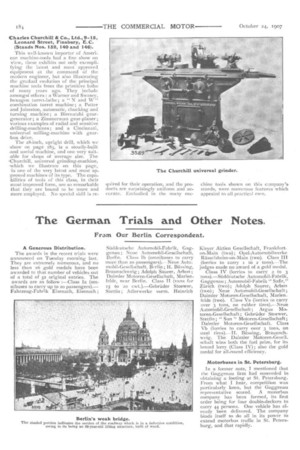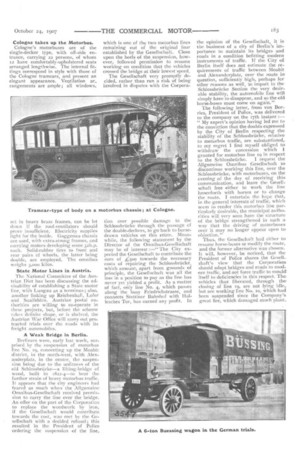The German Trials and Other Notes,
Page 16

Page 17

If you've noticed an error in this article please click here to report it so we can fix it.
From Our Berlin Correspondent.
A Generous Distribution.
The awards in the recent trials were announced on Tuesday morning last. They are extremely numerous, and no less than 26 gold medals have been awarded to that number of vehicles out of a total of 52 original entries. The awards are as follow :—Class Ia (omnibuses to carry up to 20 passengers).-Fahrzeug-Fabrik Eisenach, Eisenach ; Suddeutsche Automobil-Fabrik, Gaggenau; Neue Automobil-Gesellschaft, Berlin. Class lb (omnibuses to carry more than 20 passengers).—Neue Automobil-Gesellschaft, Berlin ; H. Bussing, Braunschweig; Adolph Saurer, Arbon ; Daimler Motoren-Gesellschaft, Marienfelde, near Berlin. Class II (vans for is to 20 cwt.).—Gebrilder Stoewer, Stettin ; Adlerwerke vorm. Heinrich
Kley-er Aktien Gesellschaft, Frankforton-Main (two); Opel-Automobilwerke Rtisselsheim-on-Main (two). Class III (lorries to carry i to 2 tons).—The judges made no award of a gold medal.
Class IV (lorries to carry 2 to 3 tons).—Siiddeutsche Automobil-Fabrik, Gaggenau; Aulumobil-Fabrik " Safir," Zurich (two); Adolph Saurer, Arbon (two); Neue Autornobil-Gesellschaft; Daimler Motoren-Gesellschaft, Marienfelde (two). Class Va (lorries to carry over 3 tons, on rubber tires).—Neue Automobil-Gesellschaft ; Argus Motoren-Gesells-chaft ; Gebriider Stoewer, Stettin ; " Sun " Motoren-Gesellschaft ; Daimler Motoren-Gesellschaft. Class Vb (lorries to carry over 3 tons, on steel tires).—II. Bussing, Braunschweig. The Daimler Motoren-Gesellschaft wins both the fuel prize, for its benzol lorry (Class IV); also the gold medal for all-round efficiency.
Motorbuses in St. Petersburg.
In a former note, I mentioned that the Gaggenau firm had succeeded in obtaining a footing at St. Petersburg. From what I hear, competition was particularly keen, but the Gaggenau representative scored. A motorbus company has been formed, its first order being for four double-deckers to carry 44 persons. One vehicle has already been delivered. The company binds itself to do all in its power to extend motorbus traffic in St. Peters.. burg, and that rapidly.
Cologne takes up the Motorbus.
Cologne's motorbuses are of the single-decker type, with off-side entrance, carrying 22 persons, of whom 12 have comfortably-upholstered seats arranged lengthwise. The internal fittings correspond in style with those of the Cologne tramcars, and present an elegant appearance. Ventilation ar_ rangements are ample ; all windows, set in heavy brass frames, can be let down if the roof-ventilators should prove insufficient. Electricity supplies light for the inside. Gaggenau chassis are used, with extra-strong frames, and carrying motors developing some 3211.p. each. Solid-rubber tires to front and rear pairs of wheels, the latter being double, are employed. The omnibus weighs 3,000 kilos.
State Motor Lines in Austria.
The National Committee of the Austrian Diet has been discussing the advisability of establishing a State motor line, with Lungau as a terminus ; also, another linking up Reichenhall, Lofer and Saalfelden. Austrian postal authorities are willing to co-operate in these projects, but, before the scheme takes definite shape, or is shelved, the Austrian War Office will carry out protracted trials over the roads with its freight automobiles.
A Weak Bridge in Berlin.
Berliners were, early last week, surprised by the suspension of motorbus line No. 19, connecting up the Moabit district, in the north-west, with Alexanderplatz, in the centre, the suspension being due to the unfitness of the old Schlossbriicke—a lifting-bridge of wood, built in 1822-4—to bear the further strain of heavy motorbus traffic. It appears that the city engineers had feared as much when the Alle-,emeine Omnibus-Gesellschaft received permission to carry the line over the bridge. An offer on the part of the Corporation to replace the woodwork by iron, if the Gesellschaft would contribute towards the cost, was met by the Gesellschaft with a decided refusal ; this resulted in the President of Police ordering the suspension of the line,
which is one of the two motorbus lines remaining out of the original four established by the Gesellschaft. Close upon the heels of the suspension, however, followed permission to resume working on condition that the vehicles crossed the bridge at their lowest speed.
The Gesellschaft very promptly decided, rather than run a risk of being involved in disputes with the Corpora
tioia over possible damage to the Schlossbriicke through the passage of the double-deckers, to go backto horsedrawn vehicles on this rotate. Meanwhile, the following statement by the Director of the Omnibus-Gesellschaft may be of interest :-"The City expected the Gesellschaft to contribute the sum of 4.500 towards the necessary costs of repairing the Schlossbrucke, which amount, apart from grounds of principle, the Gesellschaft was all the less in a position to pay as the line has never yet yielded a profit. As a matter of fact, only line No. 4, which passes along the busy Friedrichstrasse, and connects Stettiner Bahnhof with Hallesches Tor, has earned any profit. In the opinion of the Gesellschaft, it is the business of a city of Berlin's importance to maintain its bridges and roads in a condition befitting modern instruments of traffic. If the City ot Berlin itself does not estimate the requirements of traffic between Moabit and Alexanderplatz, over the route irr question, sufficiently high, perhaps for other reasons as well, 1.o impart to the Schlossbrucke Section the very desirable stability, the automobile line will simply have to disappear, and so the old horse-buses must come on again."
The following letter, from von Borries, President of Police, was delivered to the company on the 17th instant :— " My expert's opinion having led me to the conviction that the doubts expressed by the City of Berlin respecting the stability of the Schlossbrficke, relative to motorbus traffic, are substantiated, to my regret I find myself obliged to withdraw the concession which I granted for motorbus line 19 in respect to the Schlossbriicke. I request the Allgemeine Omnibus Gesellschaft to discontinue working this line, over the Schlossbrficke, with motorbuses, on the evening of the day of receiving this communication, and leave the Gesellschaft free either to work the line henceforth with horses or to change the route. I entertain the hope that, in the general interests of traffic, which seem to render this motorbus line particularly desirable, the municipal authorities will very soon have the structure of the bridge strengthened in such a way that the driving of motorbuses over it may no longer appear open to objection."
Thus, the Gesellschaft had either to resume horse-buses or modify the route, and the former alternative was chosen. It will, however, be noticed, that the President of Police shares the Gesellshaft's view that the Corporatiom should adapt bridges and roads to modern traffic, and not force traffic to mould itself to deficiencies in this respect. Thevehicles thus liberated, through the closing of line 19, are not lying idle,. but are working line No. to, which had been suspended since the Company's great fire, which damaged much plant.


























